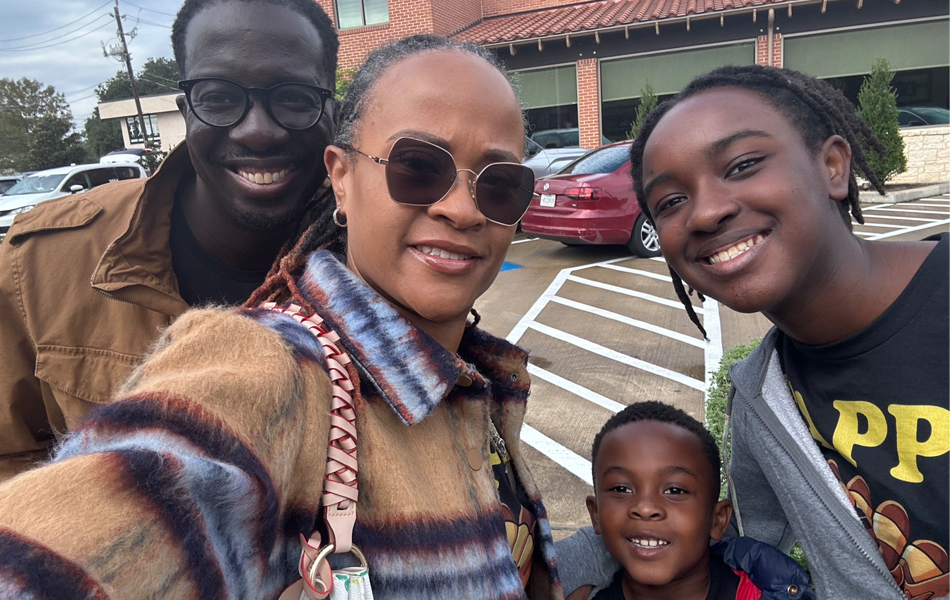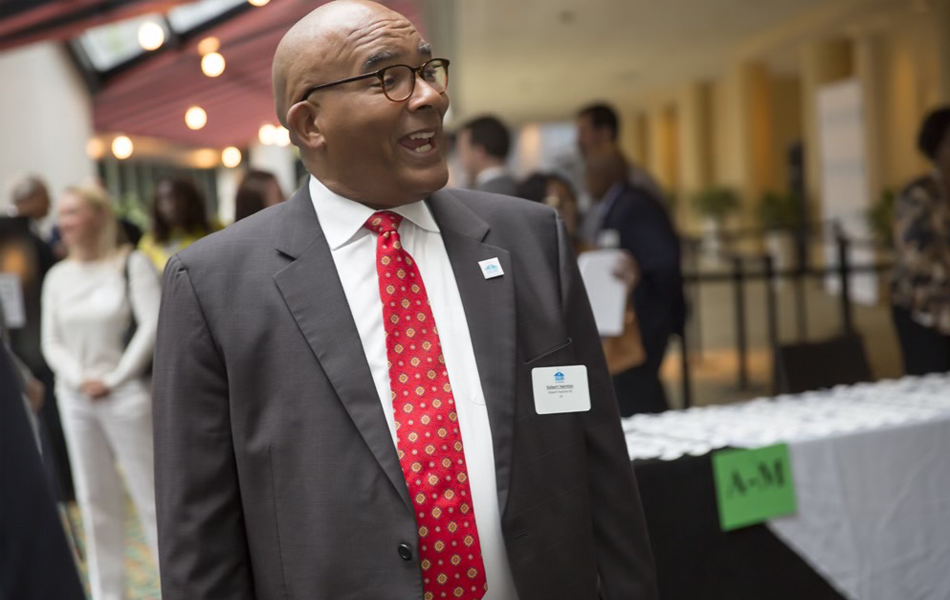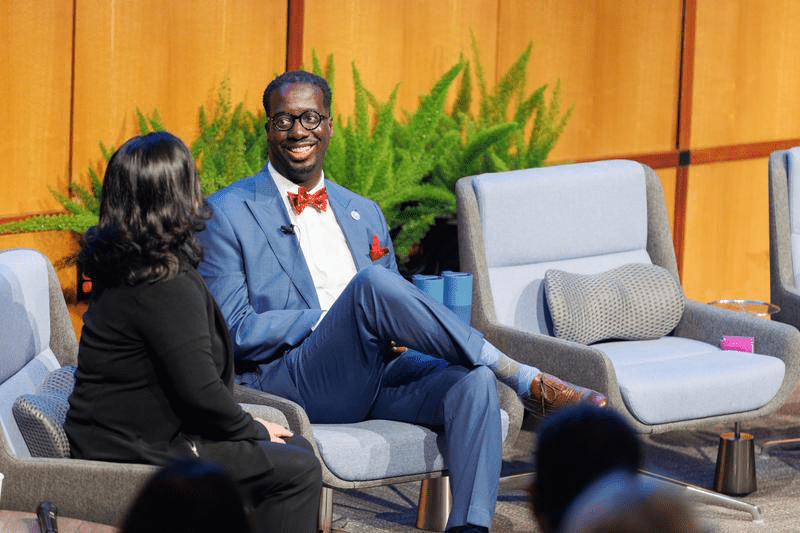Otis Wilson Jr. had been where Robert Hairston was and knew how he was feeling. And what he was thinking about.
Death.
“After my diagnosis, I found myself thinking about it regularly. How can you not? You’re suddenly confronted with, in a very real way, your mortality,” Wilson said. “I went into therapy because that thinking can take you to some dark places.”
Wilson, who is an Amgen employee, had been diagnosed with multiple myeloma in December 2017. Before that, his life was normal: A wife, two children, a good career at Amgen as a senior oncology specialist based in Houston. He was living the life he had imagined – and he had dreams still to be achieved.
But the unimaginable was being told he had multiple myeloma, a rare and incurable type of blood cancer that accounts for 1.8% of all new cancer cases, according to the National Cancer Institute. Each year, there are an estimated 35,730 new cases of myeloma diagnosed and 78.4% of the cases affect people between the ages of 55-84.
It also tends to occur in Black men and women at the highest rates, more than double the rate in any other race or ethnicity, with Black men developing multiple myeloma at a rate of 16.8 and 12.8 cases per 100,000, according to the National Cancer Institute data.1
Wilson knew a cancer diagnosis can hit someone hard. So, when he learned Hairston got it a few years after he did, he was determined to offer help right away.
“I wanted to him to know there was support,” he said. “Doctors will attack the physical aspects of it, but I didn’t want to neglect the mental health aspect because that is very real, too.”
Wilson had learned mental health was critical and used his own experience to help Hairston. And he also decided to try and help others, too, by writing a personal essay. He hoped that would help others battling the emotions that come with a cancer diagnosis.

Otis Wilson Jr. with his wife Tracy and two children, Otis Aka Tre and O'Rylee (far right). Photo courtesy of Otis Wilson Jr.
Meeting Robert
Wilson first met Hairston through a fraternity meeting in Tennessee about five years ago. The two hit it off , while sharing stories about their lives and experiences raising a family.
Hairston recalled how friendly, upbeat and optimistic Wilson was. But that demeanor changed when Wilson told him in 2017 he had been diagnosed with multiple myeloma.
“I think he took it hard,” Hairston said. “I think he tried to smile through it a lot.”
When Wilson was bedridden and began treatment, Hairston recalled taking food to him. He remembered the room vividly – the curtains were drawn. No music. No television was on. It was quiet. He tried to stay positive, but seeing Wilson laying there had a deep impact on him.
“I felt helpless,” Hairston said. “I wanted to do something and wasn’t quite sure what to do and I worried anything I might do would amplify his despair.”
Wilson said he was struggling then. His body was betraying him and he couldn’t let his mind follow.
His mind forced him to deal with the immediacy of his diagnosis and it was slowly squeezing out the dreams of travelling the world with his family and setting up financially so that they would never have to worry about fiscal insecurity.
Fear of regret creeped into his mind, too. Had he done enough with his life before getting this disease? Were those goals out of reach now?
The rollercoaster of treatment over the past few years helped him with perspective.
“It’s made my life now more real,” he said. “You can spend half of your life thinking about what you want to do and I’m not doing that anymore.”
Then, in 2019, Hairston got some news and soon contacted Wilson.
He had been diagnosed with multiple myeloma, as well.

Robert Hairston was diagnosed with multiple myeloma two years after Otis Wilson Jr. was diagnosed. The two helped each other through their fight against the disease. Photo courtesy of Robert Hairston.
Words of Encouragement
Hairston remembered with complete clarity the doctor telling him he had cancer.
“It hits you like a bomb,” Hairston said. “Nobody expects to get cancer – that happens to other people. But still, it happened to me and that was astounding.”
He had only become aware of Multiple Myeloma because of Wilson’s diagnosis two years earlier.
When Hairston contacted Wilson, he was not sure what to expect.
“His words of encouragement were so important,” Hairston said. “His suggestions on how to talk to the oncologist were important. Because of my faith, I didn’t stay in my dark place very long, but through Otis, it was on my mind to take care of mental health as well as following the treatment regimen.”
The two bonded over their common diagnosis and Wilson found helping Hairston was helping his mental health, too. He said he realized that a cancer diagnosis can be overwhelming and being able to help his friend understand what to expect and talking about Hairston’s doubts and fears helped quiet his own.
Hairston joined support groups in his area and continued to talk with Wilson – even as they now live in different states. He said they text and talk regularly to check in on each other, and Hairston said he plans to visit Wilson in Houston this summer.
Wilson said he tries to talk with as many people as he can that are struggling with their mental health. And, in 2022, he took it one step further – he wrote an essay about the importance of addressing mental health.
Pen to Paper
The writing didn’t come easy at first as he was confronting both his past and his future.
He remembered thinking how he wasn’t aware of anyone in his family having the disease. He remembered going back through his mind to try and think about what he ate or did that may have contributed to him getting it.
He remembered the fear that he suddenly had to live his entire life immediately.
Organizing his thoughts and feelings on paper felt overwhelming at first. But after years of going to therapy and treating his mind along with his body, the words began to flow more freely and with more clarity as he reflected on moving forward with his life.
In April 2022, he published a short essay in a newsletter.
“I have felt pressure in many ways in my life but nothing on this level of what I feel currently,” he wrote. “I could have chosen to escape into a cocoon but after a long talk with my wife, and God, I had to seek help to better myself. In seeking help I learned to control the scary, confusing, raw and demeaning experience I felt going on inside my head and heart.”
Knowing people were reading it made him feel like he was contributing to the world in a positive way – even as it also felt slightly terrifying.
“It was scary to say the least, but also liberating to get so much off my chest,” Wilson said. “I’ve always been taught to keep work and personal completely separate. I was breaking that rule and being so openly vulnerable which can be seen as a sign of weakness.”
Sharing his story has become a part of who he is.
When he took the stage at Amgen’s Mission Week in 2023, an annual event where employees hear directly from patients with serious illnesses, he was honest about his situation – describing a setback in his treatment, but also staying positive and staying behind after his panel presentation to talk to others who had been diagnosed with cancer.

Amgen Advocacy Relations Director Linda Murakami interviews Otis Wilson Jr. at a 2023 Mission Week panel session in Thousand Oaks, California. Amgen File photo
He also joined CoreUS, Amgen’s group that formed after Mission Week and aims to be a support system for colleagues and family members who are battling illnesses.
Wilson said advocating for mental health as a part of a cancer treatment gives him more purpose in life.
“In discovering of myself I feel if you let yourself become a victim of the world, it can contaminate your mind and take you to a place where you do not want to be,” he wrote. “Therapy has helped me identify what makes me tick, my cares, my loves and also my dislikes. Life is an ever-changing thing and you have to ride the wave to your happy place.”
References:
- Cancer Stat Facts: Myeloma, SEER data from the National Cancer Institute: https://seer.cancer.gov/statfacts/html/mulmy.html





